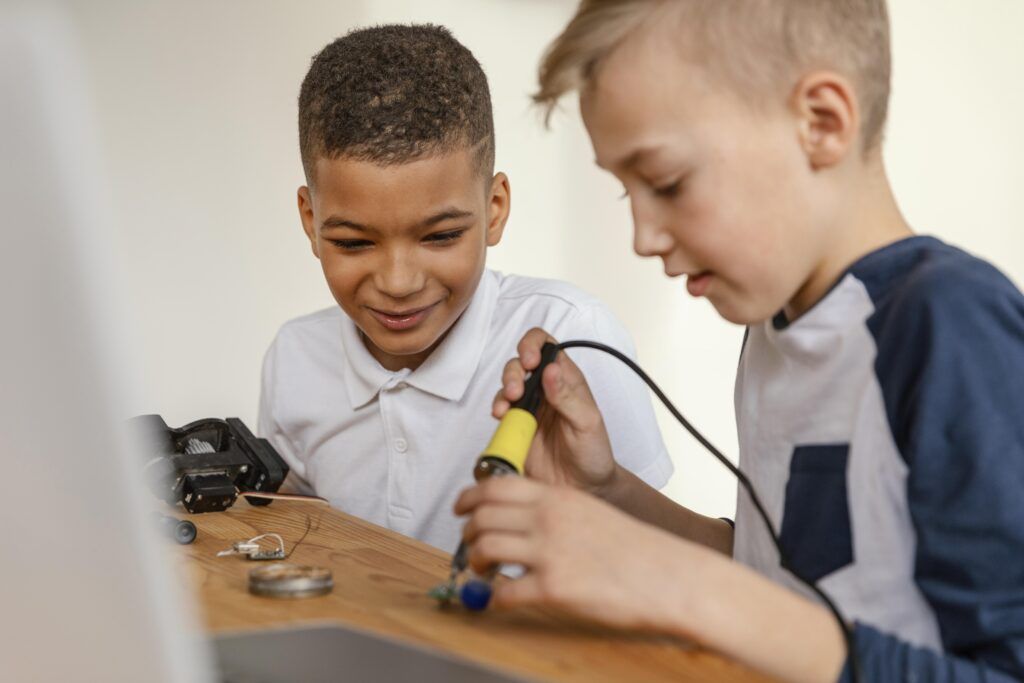The application of new technologies in education
The application of new technologies in education
Applying new technologies in education allows us to expand the capabilities of our students, through educational methods that go beyond traditional classes based on listening and memorisation.
At Aravaca International we apply ICT in all educational aspects that form part of our programmes. Our objective is based on offering our students a digital learning environment, which allows them to work on a daily basis with digital tools that are now commonplace for a generation that has been born into a digital world.
What are ICTs and what is their use in educational spaces?
What we know as ICTs are a set of technologies related to information and communication. ICTs create a series of digital channels, oriented to the transfer of information.
In the academic environment, the application of this type of technology has been a revolution. Not only do they allow us to get out of the routine of lectures, but they are also a very useful means of motivating the student and insisting on the practical sense of teaching.
The application of new technologies in education is currently a dynamic process. Day by day we develop new methods to implement digital tools in the school environment. At Aravaca International we know how important it is for today’s generations to have the technology that will be decisive for their future.
The impact of ICT on pupils
Our experience has shown us that the advantages of creating a digital environment in the school have many advantages for the pupils.
- Motivation and interest: Pupils assimilate knowledge that comes from digital channels more quickly, the reason being that they are more motivated and predisposed to learn.
- Cooperation: One of the main advantages of new technologies in the education sector is that they encourage collaboration between students, and improve attitudes related to cooperation and teamwork.
- Creativity: These tools enhance creativity. ICTs propose a space to the learner in which he/she can develop all his/her abilities in a personal way.
- Adaptation: The future is digital; a pupil who learns to handle digital devices from the first years of school is preparing for his or her future.
ICT in infant and primary school
Aravaca International is an international private school, which means that our programmes include language learning from the first school years. Our experience has shown us that when a pupil assimilates a concept from the first years of school, not only does it come naturally, but this ability is maintained on a permanent basis.
In the same way that our pupils learn English from nursery school, they also begin to work with digital tools from the first years of school. The aim is that they perceive technology as an essential tool for their daily lives, and not just as a means for leisure.
By primary school, pupils are already familiar with the functions of ICTs and their application, and can make the most of their potential in the classroom. During the primary school years, the application of new technologies allows us to establish knowledge that will be basic for their future.
ICTs in secondary and pre-university courses
During the secondary school years, the student chooses his or her own academic path, based on what will be his or her subsequent education. ICTs allow us to delve deeper into technical aspects of different subjects, based on an educational method that is more interesting for the student.
Digital platforms facilitate online work, Aravaca International offers its students the possibility of studying an International Baccalaureate, the use of ICT allows us to create a network formed by students and centres from all over the world, developing a comprehensive educational project.
The most important university centres in the world already base a large part of their programmes on the application of technology oriented towards teaching. At Aravaca International we prepare our students so that their adaptation to the university environment is appropriate, and so that they are used to learning through the application of ICTs.
Digital literacy and competence
Beyond the application of technology to certain aspects of education, our syllabuses are committed to developing a comprehensive plan that favours students’ digital literacy and competence.
Nowadays, learning basic programming is as important as speaking several languages, having the ability to handle different devices in a predictive way, prepares us to interact with all kinds of digital terminals.
Digital competence is a generic term that refers to a person’s ability to use and interpret a digital medium. It is true that students today already acquire skills oriented to the use of these technologies, but it is important that we teach them to develop this ability, in order to take advantage of the educational potential that ICTs offer us.
It is common for them to see technology as a means oriented towards leisure and the consumption of audiovisual content, but by using it in the classroom we can also help them to perceive the educational side of technology and take advantage of it.
New technologies at Internacional Aravaca
Our experience allows us to accredit the advantages that the digital educational environment offers students. Active methodologies are increasingly incorporating the use of ICTs in the classroom. At Internacional Aravaca we are aware of their advantages, which is why we motivate our students to face the challenge of using ICTs and their implications for their future.
At Internacional Aravaca we work every day to continue incorporating new digital media into our classrooms, from the first years to the Baccalaureate, we are proud to know that our students finish their studies having acquired the digital skills that will be key for their university studies and for their future employment.
